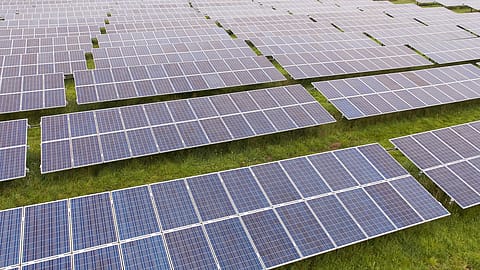Solar equipment imports drop 25%; exports up 3x in indigenisation push
Imports of solar cells and modules stood at ₹21,850 crore in 2022.

While India's solar equipment exports surged by 321%, imports decreased by 25% in 2022, indicating positive results on efforts to rapidly increase domestic manufacturing capacity, while discouraging imports mainly from China.
India exported solar PVs and modules worth ₹4,640 crore in 2022, whereas the same was worth only ₹1100 crore in 2021, says Mercom, which tracks renewable projects worldwide. As against this, imports of solar cells and modules were worth ₹21,850 crore in 2022 compared to ₹29,200 crore in 2021, when numerous stalled projects due to the Covid-19 stalemate were restarted for completion.
With effect from April 1, 2022, India introduced Basic Customs Duty of 25% on import of solar PV cells and 40% duty on import of solar PV modules. Besides, the Government came up with a Approved List of models and manufacturers (ALMM) and did not include Chinese companies in the list.
India is planning to add about 280 gigawatt (GW) of solar capacity by 2030, but was dependent on China for 80% of the equipment until a couple of years ago. In the FY23 budget, the Central Government announced an additional ₹19,500 crore Production Linked Incentive (PLI) scheme to boost local manufacturing of solar cells and modules and its supply chain.
Earlier, the Government had announced a ₹4,500 crore scheme to promote local manufacturing, which was less than 10GW of capacity until a few years ago. India's solar photovoltaic module manufacturing capacity exceeded 39 GW at the end of September 2022 and is expected to reach 95 GW by the end of the 2025, says a Mercom report.
Meanwhile, sources say the Government is planning to suspend the ALMM list for a few months to allow imports of solar modules and cells, due to inadequate local production due to shortage of raw materials and supply chain. With a view to fast track implementation of renewable projects, the Government has issued a circular to blacklist for 3-5 years companies that have won Government tenders but failed to meet commissioning deadlines. These companies will not be able to participate in tenders for 3-5 years and their bank guarantees will be encashed as per tender norms.